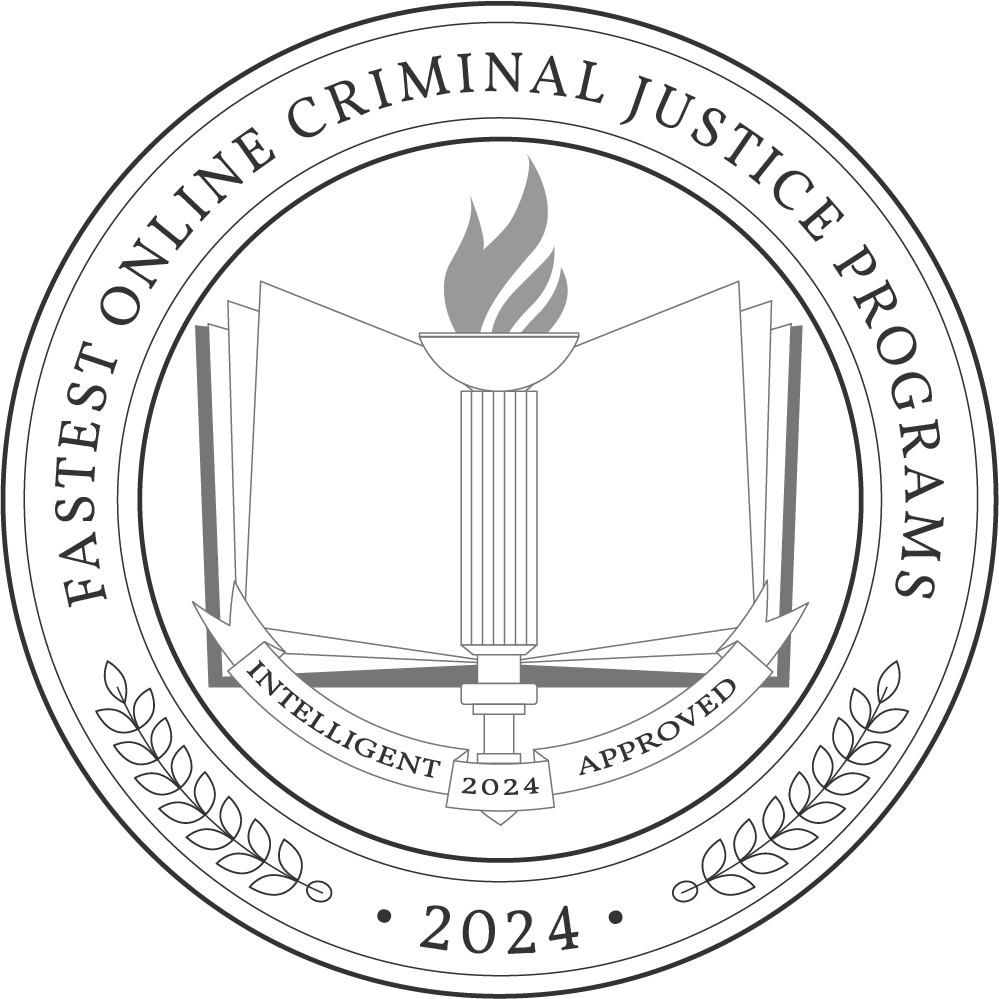Want to earn your degree in criminal justice as fast as possible? In addition to showing you the shortest criminal justice programs available, this guide will also help you find other ways to speed up the process of getting your degree, such as maximizing your courseload and earning credits through prior learning assessment.
How Long Do Criminal Justice Degree Programs Usually Take?
The amount of time it takes to earn your criminal justice degree depends on several factors, including:
- Level of educational attainment: It typically takes two years of full-time study to earn an associate degree, four years to earn a bachelor’s (two if you already have an associate degree), and six years to earn a master’s (two if you already have a bachelor’s). There’s more variation when it comes to earning a doctorate, as these programs usually require writing a dissertation or completing some other original research project, which can take anywhere from one to four years in addition to the doctorate-level coursework you would need to complete.
- School selection: It’s worth noting that, for any given degree (especially graduate degrees), some schools will require you to complete more credit hours than others. For example, the online Master’s in Criminal Justice program at Liberty University involves 36 credit hours of coursework, while a similar program at Xavier University only requires 30 credit hours. This six-credit difference is the equivalent of two standard college courses.
- Course load: Anyone who wants to earn a degree quickly should take on at least a full-time course load, generally considered 12 credit hours per semester. If you have the time and energy for it, a heavier courseload would allow you to earn your degree even faster, though most schools will limit you to no more than 18 credit hours per semester.
How To Earn Your Criminal Justice Degree Faster
As mentioned above, you can reduce the amount of time it takes to earn your criminal justice degree by selecting a school that requires a relatively low number of credit hours to graduate and taking as many courses per semester as you can reasonably handle.
Another way to obtain your degree faster is through prior learning assessment. Many schools will allow you to earn some college credit without actually completing any coursework if you can demonstrate that you already know the subject matter. The most common options for earning prior learning credits include examinations (AP, IB, CLEP, etc.), military experience, and workplace training.
If you already work in the criminal justice field, you may be able to get college credit for any industry certifications that you currently hold. For example, the Community College of Baltimore County awards 27 credits toward an associate degree to those with a Maryland Police Officer Certification. Every school has its own set of policies regarding prior learning assessment, and you may need to reach out to academic advisors at each option you’re considering to see how many credits you can earn from your past experience.
What Can I Do With a Criminal Justice Degree?
A college education isn’t usually required for entry-level criminal justice work, but earning a degree can still be worthwhile. Indeed, a degree is often needed for the most attractive job opportunities, and it will help you advance to higher positions wherever you end up.
The most common occupations for workers with a criminal justice degree include:
- Correctional officer or bailiff: Correctional officers provide security for penal institutions, while bailiffs provide security for courtrooms. In general, this occupation only requires a high school diploma and has an average salary of $47,920. However, working for the federal government in this role has higher standards and rewards. These jobs tend to require a bachelor’s degree and have an average salary of $59,920.
- Police officer or detective: There are many different types of police jobs available. While you only need a high school diploma to become a local patrol officer (average salary of $64,610), you would likely need a degree to work as a detective or criminal investigator ($83,640). As with correctional officers and bailiffs, federal government jobs for police and detectives also tend to require a college degree and offer a higher salary ($93,970).
- Probation or parole officer: Probation officers supervise people placed on probation rather than sentenced to prison. Parole officers help those released from prison re-enter society. They make an average salary of $60,250. A college degree is typically required for work as a probation or parole officer, even for entry-level positions.
- Private investigator: This occupation can involve a variety of investigative tasks, such as performing background checks, conducting surveillance, and finding missing persons. The average salary for private investigators is $59,380. However, you should be able to make a little more than that if you find work as an investigator in the insurance and finance industry (average salary of $64,010). Some organizations that employ private investigators require applicants to have a college degree, and you’ll likely need to already have experience in a similar role, such as law enforcement or military intelligence.
Our Research
This list features some of the country’s fastest online criminal justice degree programs. Each school featured is a nonprofit, accredited institution, either public or private, with a high standard of academic quality for post-secondary institutions.
We evaluated each school’s program on tuition costs, admission, retention and graduation rates, faculty, and reputation. Then, we calculated the Intelligent Score on a scale of 0 to 100. Read more about our ranking methodology.
Next, we compared this comprehensive list of the fastest online criminal justice degree programs to a list of aggregated college rankings from reputable publications, such as U.S. News & World Report, to simplify a student’s college search. We pored through these rankings so students don’t have to.
The 50 Fastest Online Criminal Justice Degree Programs
